Campus/People
-
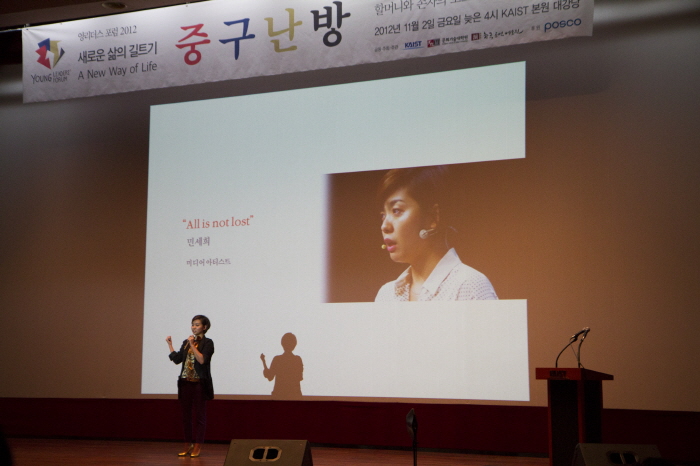 Collaborated Performance and Talk Battle Event Held by Graduate School of Culture Technology, KAIST
A unique event consisting of a new media performance and talk battle was held for middle school, high school, and college students during the winter break.
The Graduate School of Culture Technology at KAIST and the Korea Art Conservatory co-organized the 3rd Young Leaders Forum under the title “Collaboration of the Current and the New Culture” on January 18th at the Seoul Namsan Traditional Theater.
The Young Leaders Forum was founded to share knowledge and wisdom among different fields and generations and to foster creative lifestyles through the collaboration of wisdom.
The collaborated performance, “The Garden of Western Heaven”, was performed using new media technology by students from the Graduate School of Culture Technology and actors from the Korea Art Conservatory.
Three panels participated in the “Talk Battle” and held a discussion on “The New Culture from Performance and Collaboration”.
Woong-Rae Cho, CEO of The Mackiss Company, who sponsored the clay road in Gyejok Mountain and the Concert in the Forest, Professor Sung-Kuk Kim from School of Korean Music at Chung-Ang University, and Je-Ho Oh, a graduate student from the Graduate School of Culture Technology at KAIST participated in the discussion and shared their opinions with the audience.
2014.01.27 View 5939
Collaborated Performance and Talk Battle Event Held by Graduate School of Culture Technology, KAIST
A unique event consisting of a new media performance and talk battle was held for middle school, high school, and college students during the winter break.
The Graduate School of Culture Technology at KAIST and the Korea Art Conservatory co-organized the 3rd Young Leaders Forum under the title “Collaboration of the Current and the New Culture” on January 18th at the Seoul Namsan Traditional Theater.
The Young Leaders Forum was founded to share knowledge and wisdom among different fields and generations and to foster creative lifestyles through the collaboration of wisdom.
The collaborated performance, “The Garden of Western Heaven”, was performed using new media technology by students from the Graduate School of Culture Technology and actors from the Korea Art Conservatory.
Three panels participated in the “Talk Battle” and held a discussion on “The New Culture from Performance and Collaboration”.
Woong-Rae Cho, CEO of The Mackiss Company, who sponsored the clay road in Gyejok Mountain and the Concert in the Forest, Professor Sung-Kuk Kim from School of Korean Music at Chung-Ang University, and Je-Ho Oh, a graduate student from the Graduate School of Culture Technology at KAIST participated in the discussion and shared their opinions with the audience.
2014.01.27 View 5939 -
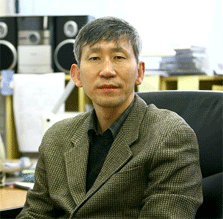 Professor Suk-Bok Chang receives 14th Korea Science Award in the field of Chemistry
Professor Suk-Bok Chang from the Department of Chemistry at KAIST received the “2013 Korea Science Award” in chemistry hosted by the National Research Foundation and the Ministry of Science, ICT, and Future Planning, Republic of Korea.
The Korea Science Award is a presidential award of Korea, which was first established in 1987 to recognize research excellence in natural science. Three scientists are selected for the award in every other year.
Professor Chang primarily researches the catalyzing mechanism of carbon-hydrogen bonds in organic molecules. He has succeeded in making great progress in the field of organic chemistry especially in developing a new type of transition metal catalytic behavior that can be applied to low-reactivity compounds.
Hydrocarbons are abundant in nature, but its unreactive nature in ambient conditions makes it unsuitable as reactant for compound synthesis. In addition, the mechanism behind transition metal catalyzed carbon-hydrogen bond synthesis has not been proven sufficiently.
The prediction that fossil fuels will be depleted before the end of the century makes hydrocarbon synthesis an extremely important matter.
The need for an effective hydrocarbon synthesis method inspired Professor Chang to pursue research in the transition metal catalysis method and to develop a catalytic system that would allow efficient synthesis even in ambient conditions.
Professor Chang has been the lead researcher for the Institute for Basic Science’s “molecule catalysis reaction research team” since December 2012 and has been carrying out this research in KAIST.
2014.01.27 View 9443
Professor Suk-Bok Chang receives 14th Korea Science Award in the field of Chemistry
Professor Suk-Bok Chang from the Department of Chemistry at KAIST received the “2013 Korea Science Award” in chemistry hosted by the National Research Foundation and the Ministry of Science, ICT, and Future Planning, Republic of Korea.
The Korea Science Award is a presidential award of Korea, which was first established in 1987 to recognize research excellence in natural science. Three scientists are selected for the award in every other year.
Professor Chang primarily researches the catalyzing mechanism of carbon-hydrogen bonds in organic molecules. He has succeeded in making great progress in the field of organic chemistry especially in developing a new type of transition metal catalytic behavior that can be applied to low-reactivity compounds.
Hydrocarbons are abundant in nature, but its unreactive nature in ambient conditions makes it unsuitable as reactant for compound synthesis. In addition, the mechanism behind transition metal catalyzed carbon-hydrogen bond synthesis has not been proven sufficiently.
The prediction that fossil fuels will be depleted before the end of the century makes hydrocarbon synthesis an extremely important matter.
The need for an effective hydrocarbon synthesis method inspired Professor Chang to pursue research in the transition metal catalysis method and to develop a catalytic system that would allow efficient synthesis even in ambient conditions.
Professor Chang has been the lead researcher for the Institute for Basic Science’s “molecule catalysis reaction research team” since December 2012 and has been carrying out this research in KAIST.
2014.01.27 View 9443 -
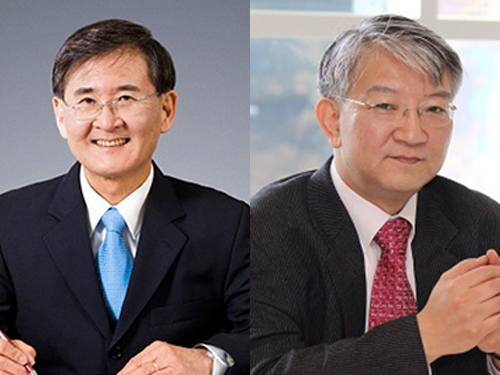 KAIST Participates in the 2014 Davos Forum on January 22-25 in Switzerland
Through the sessions of the Global University Leaders Forum, IdeasLab, and Global Agenda Councils on Biotechnology, KAIST participants will actively engage with global leaders in the discussion of issues on education innovation and technological breakthroughs.
The 2014 Annual Meeting of the World Economic Forum (WEF), known as the Davos Forum, will kick off on January 22-25 in Davos-Klosters, Switzerland, under the theme of "The Reshaping of the World: Consequences for Society, Politics, and Business." Each year, the Forum attracts about 2,500 distinguished leaders from all around the world and provides an open platform to identify the current and emerging challenges facing the global community and to develop ideas and actions necessary to respond to such challenges.
President Sung-Mo Steve Kang and Distinguished Professor Sang Yup Lee from the Department of Chemical and Biomolecular Engineering, KAIST, will attend the Forum and engage in a series of dialogues on such issues as Massive Open Online Courses, new paradigms for universities and researchers, the transformation of higher education, the role and value of scientific discoveries, and the impact of biotechnology on the future of society and business.
At the session entitled "New Paradigms for Universities of the Future" hosted by the Global University Leaders Forum (GULF), President Kang will introduce KAIST"s ongoing online education program, Education 3.0. GULF was created in 2006 by WEF, which is a small community of the presidents and senior representatives of the top universities in the world.
Implemented in 2012, Education 3.0 incorporates advanced information and communications technology (ICT) to offer students and teachers a learner-based, team-oriented learning and teaching environment. Under Education 3.0, students study online and meet in groups with a professor for in-depth discussions, collaboration, and problem-solving. KAIST plans to expand the program to embrace the global community in earnest by establishing Education 3.0 Global in order to have interactive real-time classes for students and researchers across regions and cultures.
President Kang will also present a paper entitled "Toward Socially Responsible Technology: KAIST"s Approach to Integrating Social and Behavioral Perspectives into Technology Development" at another session of GULF called "Seeking New Approaches to Critical Global Challenges." In the paper, President Kang points out that notwithstanding the many benefits we enjoy from the increasingly interconnected world, digital media may pose a threat to become a new outlet for social problems, for example, Internet or digital addiction.
Experts say that early exposure to digital devices harms the healthy development of cognitive functions, emotions, and social behavior. President Kang will introduce KAIST"s recent endeavor to develop a non-intrusive technology to help prevent digital addiction, which will ultimately be embedded in the form of a virtual coach or mentor that helps and guides people under risk to make constructive use of digital devices. President Kang stresses the fundamental shift in the science and technology development paradigm from research and development (R&D) to a research and solution development (R&SD), taking serious consideration of societal needs, quality of life, and social impacts when conducting research.
Professor Sang Yup Lee will moderate the IdeasLab session at the Davos Forum entitled "From Lab to Life with the California Institute of Technology (Caltech)." Together with scientists from Caltech, he will discuss scientific breakthroughs that transform institutions, industries, and individuals in the near future, such as the development of damage-tolerant lightweight materials with nanotechnology, the ability to read and write genomes, and wireless lab-in-the-body monitors. In addition, he will meet global business leaders at the session of "Sustainability, Innovation, and Growth" and speak about how emerging technologies, biotechnology in particular, will transform future societies, business, and industries.
As a current special adviser of the World Economic Forum"s (WEF) Chemicals Industry Community, Professor Lee will meet global chairs and chief executive officers of chemical companies and discuss ways to advance the industry to become more bio-based and environmentally friendly. He served as a founding chairman of WEF"s Global Agenda Councils on Biotechnology in 2013.
President Sung-Mo Steve Kang Distinguished Professor Sang Yup Lee
2014.01.17 View 9958
KAIST Participates in the 2014 Davos Forum on January 22-25 in Switzerland
Through the sessions of the Global University Leaders Forum, IdeasLab, and Global Agenda Councils on Biotechnology, KAIST participants will actively engage with global leaders in the discussion of issues on education innovation and technological breakthroughs.
The 2014 Annual Meeting of the World Economic Forum (WEF), known as the Davos Forum, will kick off on January 22-25 in Davos-Klosters, Switzerland, under the theme of "The Reshaping of the World: Consequences for Society, Politics, and Business." Each year, the Forum attracts about 2,500 distinguished leaders from all around the world and provides an open platform to identify the current and emerging challenges facing the global community and to develop ideas and actions necessary to respond to such challenges.
President Sung-Mo Steve Kang and Distinguished Professor Sang Yup Lee from the Department of Chemical and Biomolecular Engineering, KAIST, will attend the Forum and engage in a series of dialogues on such issues as Massive Open Online Courses, new paradigms for universities and researchers, the transformation of higher education, the role and value of scientific discoveries, and the impact of biotechnology on the future of society and business.
At the session entitled "New Paradigms for Universities of the Future" hosted by the Global University Leaders Forum (GULF), President Kang will introduce KAIST"s ongoing online education program, Education 3.0. GULF was created in 2006 by WEF, which is a small community of the presidents and senior representatives of the top universities in the world.
Implemented in 2012, Education 3.0 incorporates advanced information and communications technology (ICT) to offer students and teachers a learner-based, team-oriented learning and teaching environment. Under Education 3.0, students study online and meet in groups with a professor for in-depth discussions, collaboration, and problem-solving. KAIST plans to expand the program to embrace the global community in earnest by establishing Education 3.0 Global in order to have interactive real-time classes for students and researchers across regions and cultures.
President Kang will also present a paper entitled "Toward Socially Responsible Technology: KAIST"s Approach to Integrating Social and Behavioral Perspectives into Technology Development" at another session of GULF called "Seeking New Approaches to Critical Global Challenges." In the paper, President Kang points out that notwithstanding the many benefits we enjoy from the increasingly interconnected world, digital media may pose a threat to become a new outlet for social problems, for example, Internet or digital addiction.
Experts say that early exposure to digital devices harms the healthy development of cognitive functions, emotions, and social behavior. President Kang will introduce KAIST"s recent endeavor to develop a non-intrusive technology to help prevent digital addiction, which will ultimately be embedded in the form of a virtual coach or mentor that helps and guides people under risk to make constructive use of digital devices. President Kang stresses the fundamental shift in the science and technology development paradigm from research and development (R&D) to a research and solution development (R&SD), taking serious consideration of societal needs, quality of life, and social impacts when conducting research.
Professor Sang Yup Lee will moderate the IdeasLab session at the Davos Forum entitled "From Lab to Life with the California Institute of Technology (Caltech)." Together with scientists from Caltech, he will discuss scientific breakthroughs that transform institutions, industries, and individuals in the near future, such as the development of damage-tolerant lightweight materials with nanotechnology, the ability to read and write genomes, and wireless lab-in-the-body monitors. In addition, he will meet global business leaders at the session of "Sustainability, Innovation, and Growth" and speak about how emerging technologies, biotechnology in particular, will transform future societies, business, and industries.
As a current special adviser of the World Economic Forum"s (WEF) Chemicals Industry Community, Professor Lee will meet global chairs and chief executive officers of chemical companies and discuss ways to advance the industry to become more bio-based and environmentally friendly. He served as a founding chairman of WEF"s Global Agenda Councils on Biotechnology in 2013.
President Sung-Mo Steve Kang Distinguished Professor Sang Yup Lee
2014.01.17 View 9958 -
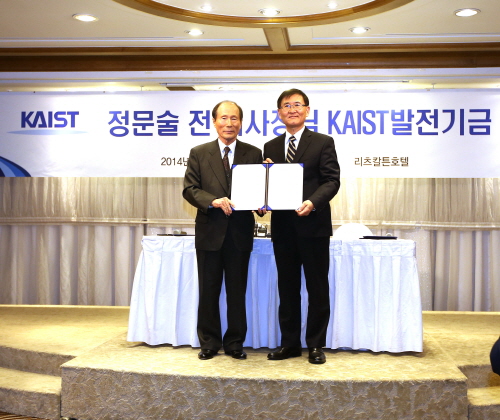 KAIST receives $20 million donation for futures studies
A retired businessman, Moon-Soul Chung, the former chief executive officer of Mirae, Inc., a semiconductor equipment company in Korea, today donated USD 20 million to the Graduate School of Future Strategy at KAIST.
It was Chung's second contribution to KAIST—his first donation of USD 28 million in 2001 supported the construction of the Bio and Brain Engineering building, a major research center on campus where biotechnology and information technology converge.
Established in 2013, the KAIST Graduate School of Future Strategy consists of three interdisciplinary graduate programs on future strategy, intellectual property, and science journalism. The Research Center for Future Strategy is an affiliate of the graduate school. KAIST is the first Korean university that offers an academic program granting a degree in futures studies.
The rapid advancement in science and technology today affects, profoundly and extensively, all corners of global society from education, politics, economy, and environment to resources, sustainability, and inequality. As we live in a highly interconnected, digitalized, and unpredictable world, analyzing the events, trends, patterns, and changes of the past and present, developing foresight, and mapping preferred futures have become more relevant than ever.
KAIST utilizes its strong tech-knowledge base in science and engineering to offer students a high quality education and training in futures thinking, skills, and methodologies to develop foresight and to plan future strategies for international relations, business and industry, national defense, science and technology, and new media. KAIST also anticipates helping government, business, public service, and non-profit organizations identify important issues and develop long-range implementation strategies to prepare for probable and preferred futures.
Moon-Soul Chung (left), the former CEO of Mirae Inc., and President Steve Kang (right), holding together the donation agreement in Seoul, January 10th, 2014
2014.01.13 View 7757
KAIST receives $20 million donation for futures studies
A retired businessman, Moon-Soul Chung, the former chief executive officer of Mirae, Inc., a semiconductor equipment company in Korea, today donated USD 20 million to the Graduate School of Future Strategy at KAIST.
It was Chung's second contribution to KAIST—his first donation of USD 28 million in 2001 supported the construction of the Bio and Brain Engineering building, a major research center on campus where biotechnology and information technology converge.
Established in 2013, the KAIST Graduate School of Future Strategy consists of three interdisciplinary graduate programs on future strategy, intellectual property, and science journalism. The Research Center for Future Strategy is an affiliate of the graduate school. KAIST is the first Korean university that offers an academic program granting a degree in futures studies.
The rapid advancement in science and technology today affects, profoundly and extensively, all corners of global society from education, politics, economy, and environment to resources, sustainability, and inequality. As we live in a highly interconnected, digitalized, and unpredictable world, analyzing the events, trends, patterns, and changes of the past and present, developing foresight, and mapping preferred futures have become more relevant than ever.
KAIST utilizes its strong tech-knowledge base in science and engineering to offer students a high quality education and training in futures thinking, skills, and methodologies to develop foresight and to plan future strategies for international relations, business and industry, national defense, science and technology, and new media. KAIST also anticipates helping government, business, public service, and non-profit organizations identify important issues and develop long-range implementation strategies to prepare for probable and preferred futures.
Moon-Soul Chung (left), the former CEO of Mirae Inc., and President Steve Kang (right), holding together the donation agreement in Seoul, January 10th, 2014
2014.01.13 View 7757 -
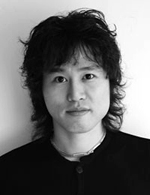 Professor Sang-Min received an award for scholar of the year from the KAISTian of the Year 2013
KAIST nominates a “Scholar of the Year” each year and presents the award to the recipient at a New Year’s opening ceremony. For the year 2013, Professor Sang-Min Bae of the Industrial Design Department at KAIST was named “KAIST Scholar of 2013” and received the award on January 2, 2014.
Professor Bae has been recognized for his design achievement in 2013: D’Light, a kinetic lighting that employs a transformable lampshade using flexible honeycomb structure, became one of the finalists in the living room and bedroom category of the International Design Excellence Award 2013 and was selected one of the best 100 for the 2013 Good Design Award. Users can easily change the shape and light intensity of the lamp by simply pivoting the lampshade with its small handle.
Professor Bae has also actively pursued his own philanthrophic projects through design: he has given the profits from the sales of his designs including D’Light directly toward a scholarship for needy children.
The Scholar of the Year award is presented to a faculty member or researcher at KAIST who has contributed to the advancement of science and technology such as publication of articles with influential research outcomes, invention of breakthrough technology, implementation of outstanding research projects, and improvement of public life. Professor Bae is the 13 th winner of the KAIST award.
The Korea Times, a leading English language newspaper in Korea, published an article on this award. For the article, please visit http://www.koreatimes.co.kr/www/news/people/2014/01/178_149117.html .
2014.01.09 View 9697
Professor Sang-Min received an award for scholar of the year from the KAISTian of the Year 2013
KAIST nominates a “Scholar of the Year” each year and presents the award to the recipient at a New Year’s opening ceremony. For the year 2013, Professor Sang-Min Bae of the Industrial Design Department at KAIST was named “KAIST Scholar of 2013” and received the award on January 2, 2014.
Professor Bae has been recognized for his design achievement in 2013: D’Light, a kinetic lighting that employs a transformable lampshade using flexible honeycomb structure, became one of the finalists in the living room and bedroom category of the International Design Excellence Award 2013 and was selected one of the best 100 for the 2013 Good Design Award. Users can easily change the shape and light intensity of the lamp by simply pivoting the lampshade with its small handle.
Professor Bae has also actively pursued his own philanthrophic projects through design: he has given the profits from the sales of his designs including D’Light directly toward a scholarship for needy children.
The Scholar of the Year award is presented to a faculty member or researcher at KAIST who has contributed to the advancement of science and technology such as publication of articles with influential research outcomes, invention of breakthrough technology, implementation of outstanding research projects, and improvement of public life. Professor Bae is the 13 th winner of the KAIST award.
The Korea Times, a leading English language newspaper in Korea, published an article on this award. For the article, please visit http://www.koreatimes.co.kr/www/news/people/2014/01/178_149117.html .
2014.01.09 View 9697 -
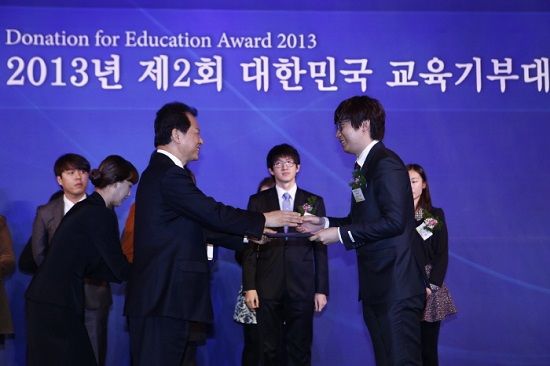 An Education Donation Club at KAIST Received the Education Minister's Award in 2013
Chalk, one of the student clubs at KAIST, shares knowledge by providing free online classes to teenage students in Korea via Internet.
Chalk, a KAIST student club which donates their educational knowledge, received an award from the Education Minister of the Republic of Korea at the 2nd Donation for Education Award held on December 16th, 2013 at the Plaza Hotel in Seoul.
The Donation for Eduation Award aims to find and reward corporations, organizations, and individuals, which have actively contributed to growing the dreams and talents of students, as well as revitalizing the culture of donation for education. It has been awarded by the Ministry of Education since 2012 to promote the awareness and participation of students for education.
Chalk provides free online video lectures on www.playchalk.com and runs a mentoring-based education program. The club has been recognized for offering online courses, math and science classes in particular, to teenage students who are from socially and economically less privileged backgrounds.
Chalk was founded by five KAIST students in 2011. Their ultimate goal is to create a society where students can fully enjoy the benefits of education, regardless of their economic conditions. About 60 undergraduate students currently participate in the club, with more than 5,000 students attending over 160 lectures without any cost.
2014.01.07 View 8834
An Education Donation Club at KAIST Received the Education Minister's Award in 2013
Chalk, one of the student clubs at KAIST, shares knowledge by providing free online classes to teenage students in Korea via Internet.
Chalk, a KAIST student club which donates their educational knowledge, received an award from the Education Minister of the Republic of Korea at the 2nd Donation for Education Award held on December 16th, 2013 at the Plaza Hotel in Seoul.
The Donation for Eduation Award aims to find and reward corporations, organizations, and individuals, which have actively contributed to growing the dreams and talents of students, as well as revitalizing the culture of donation for education. It has been awarded by the Ministry of Education since 2012 to promote the awareness and participation of students for education.
Chalk provides free online video lectures on www.playchalk.com and runs a mentoring-based education program. The club has been recognized for offering online courses, math and science classes in particular, to teenage students who are from socially and economically less privileged backgrounds.
Chalk was founded by five KAIST students in 2011. Their ultimate goal is to create a society where students can fully enjoy the benefits of education, regardless of their economic conditions. About 60 undergraduate students currently participate in the club, with more than 5,000 students attending over 160 lectures without any cost.
2014.01.07 View 8834 -
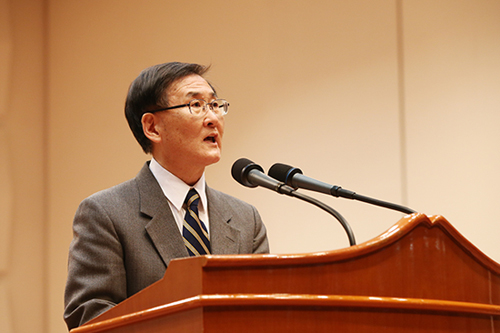 New Year's Greeting Ceremony Held on January 2nd
The year 2014 is the Year of the Wooden Horse in Chinese astrology: A dynamic (Horse) and prosperous (Wood) New Year to all at KAIST!
President Steve Kang hosted a New Year’s greeting ceremony on January 2 nd at an auditorium on campus and gave a keynote speech on major administrative policies and academic programs to take effect for the year 2014. K-Valley and End-Run projects, as well as a review of efforts to decentralize the academic system in order to grant colleges and departments more autonomy in their operation of education and research programs were among the few discussed.
The K-Valley project will help KAIST and its neighboring research complex, the Daedeok Innopolis, build a leading multi-layered, innovative cluster of startups and new businesses in Korea through close collaborations among university, research institutes, and industry. The End-Run is a project to attract global investors and companies to Korea that will capitalize on the highest quality talents and technologies developed by KAIST.
President Steve Kang said that he would continue the last year’s campaign to make the campus “happier” throughout this year, encouraging members of the KAIST community to trust and respect and communicate better with each other.
2014.01.07 View 6665
New Year's Greeting Ceremony Held on January 2nd
The year 2014 is the Year of the Wooden Horse in Chinese astrology: A dynamic (Horse) and prosperous (Wood) New Year to all at KAIST!
President Steve Kang hosted a New Year’s greeting ceremony on January 2 nd at an auditorium on campus and gave a keynote speech on major administrative policies and academic programs to take effect for the year 2014. K-Valley and End-Run projects, as well as a review of efforts to decentralize the academic system in order to grant colleges and departments more autonomy in their operation of education and research programs were among the few discussed.
The K-Valley project will help KAIST and its neighboring research complex, the Daedeok Innopolis, build a leading multi-layered, innovative cluster of startups and new businesses in Korea through close collaborations among university, research institutes, and industry. The End-Run is a project to attract global investors and companies to Korea that will capitalize on the highest quality talents and technologies developed by KAIST.
President Steve Kang said that he would continue the last year’s campaign to make the campus “happier” throughout this year, encouraging members of the KAIST community to trust and respect and communicate better with each other.
2014.01.07 View 6665 -
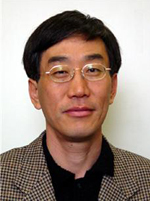 Professor Yong-Hee Lee of Physics Received the Humboldt Research Award
In recognition of his past accomplishments in research and teaching, Professor Yong-Hee Lee of Physics at KAIST received the Humboldt Research Award in November 2013. The Humboldt Research Award is annually given by the Alexander von Humboldt Foundation to internationally renowned scientists and scholars in the fields of biology, chemistry, computer science, economics, linguistics, management, mathematics, medicine, philosophy, and physics. The winners of the award are offered with 60,000 Euros of research grant as well as an opportunity to undertake prolonged periods of research in collaboration with researchers in Germany.Professor Lee, who may be the first Korean physicist receiving the award, plans to conduct joint research with colleagues at the Technical University of Berlin and University of Würzburg.
2014.01.05 View 7827
Professor Yong-Hee Lee of Physics Received the Humboldt Research Award
In recognition of his past accomplishments in research and teaching, Professor Yong-Hee Lee of Physics at KAIST received the Humboldt Research Award in November 2013. The Humboldt Research Award is annually given by the Alexander von Humboldt Foundation to internationally renowned scientists and scholars in the fields of biology, chemistry, computer science, economics, linguistics, management, mathematics, medicine, philosophy, and physics. The winners of the award are offered with 60,000 Euros of research grant as well as an opportunity to undertake prolonged periods of research in collaboration with researchers in Germany.Professor Lee, who may be the first Korean physicist receiving the award, plans to conduct joint research with colleagues at the Technical University of Berlin and University of Würzburg.
2014.01.05 View 7827 -
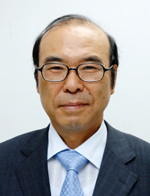 Professor Dong-Yol Yang received an award for scholar of the year 2013 from the Korean mechanical engineering community
Professor Dong-Yol Yang from the Department of Mechanical Engineering at KAIST was selected as “the scholar of the year 2013” at an annual event held by the Korean Federation of Mechanical Engineering Societies, the Korea Association of Machinery Industry, and other mechanical engineering research institutes in Korea. The event, the Day of the Machines, is the nation’s biggest gathering for engineers, scholars, and researchers in mechanical engineering, at which winners of the awards for the person of the year in academia, business, and engineering are announced.
Professor Yang was chosen for his lifetime achievement as a scholar in the field of three-dimensional shape precision processing by developing an innovative processing technology that contributes to the advancement of mechanical engineering and industry. He also introduced the three-dimensional fast processing to Korea from 1990 and developed world-class subminiature fast processing, the first of its kind in Korea.In 2013, Professor Yang identified geometric deformation elements in mechanical engineering for the first time in the world, an essential component for nano mobile system and received the best conference paper award at the 3M-Nano International Conference.
2014.01.05 View 8360
Professor Dong-Yol Yang received an award for scholar of the year 2013 from the Korean mechanical engineering community
Professor Dong-Yol Yang from the Department of Mechanical Engineering at KAIST was selected as “the scholar of the year 2013” at an annual event held by the Korean Federation of Mechanical Engineering Societies, the Korea Association of Machinery Industry, and other mechanical engineering research institutes in Korea. The event, the Day of the Machines, is the nation’s biggest gathering for engineers, scholars, and researchers in mechanical engineering, at which winners of the awards for the person of the year in academia, business, and engineering are announced.
Professor Yang was chosen for his lifetime achievement as a scholar in the field of three-dimensional shape precision processing by developing an innovative processing technology that contributes to the advancement of mechanical engineering and industry. He also introduced the three-dimensional fast processing to Korea from 1990 and developed world-class subminiature fast processing, the first of its kind in Korea.In 2013, Professor Yang identified geometric deformation elements in mechanical engineering for the first time in the world, an essential component for nano mobile system and received the best conference paper award at the 3M-Nano International Conference.
2014.01.05 View 8360 -
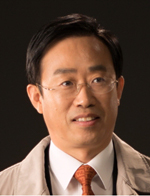 Professor Dong-Soo Han received the Prime Minister's award for creative economy in 2013
The 2013 Korea Creative Economy Awards, presented to companies or individuals that contributed to the implementation of the Korean government’s economic growth initiative called “creative economy” with the development of new technology, was held on December 12th at the InterContinental Seoul Coex. Professor Dong-Soo Han from the Department of Computer Science at KAIST received the Prime Minister’s award.
Professor Han was recognized for his research accomplishments on the development of an indoor GPS system and an integrated indoor/outdoor navigation system, as well as for his publication of a book for beginners who are interested in patents. He has applied 50 patents and registered 30 patents in Korea and abroad for the indoor positioning technology and smartphone application services.
His research work was also introduced to the public at the exhibition held after the award ceremony during December 12th-15th at the Coex convention center in Seoul.
2014.01.05 View 7381
Professor Dong-Soo Han received the Prime Minister's award for creative economy in 2013
The 2013 Korea Creative Economy Awards, presented to companies or individuals that contributed to the implementation of the Korean government’s economic growth initiative called “creative economy” with the development of new technology, was held on December 12th at the InterContinental Seoul Coex. Professor Dong-Soo Han from the Department of Computer Science at KAIST received the Prime Minister’s award.
Professor Han was recognized for his research accomplishments on the development of an indoor GPS system and an integrated indoor/outdoor navigation system, as well as for his publication of a book for beginners who are interested in patents. He has applied 50 patents and registered 30 patents in Korea and abroad for the indoor positioning technology and smartphone application services.
His research work was also introduced to the public at the exhibition held after the award ceremony during December 12th-15th at the Coex convention center in Seoul.
2014.01.05 View 7381 -
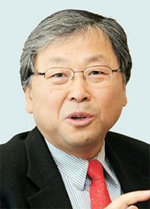 Professor Jin-Hyung Kim appointed as the founding director of the Software Policy Research Center
Professor Jin-Hyung Kim from the Department of Computer Science at KAIST was appointed as the founding director of the newly established research institute, the Software Policy Research Center. He will serve as director for three years. The research center will undertake studies and analysis on software policy, statistics, and new software technology.
2014.01.05 View 7678
Professor Jin-Hyung Kim appointed as the founding director of the Software Policy Research Center
Professor Jin-Hyung Kim from the Department of Computer Science at KAIST was appointed as the founding director of the newly established research institute, the Software Policy Research Center. He will serve as director for three years. The research center will undertake studies and analysis on software policy, statistics, and new software technology.
2014.01.05 View 7678 -
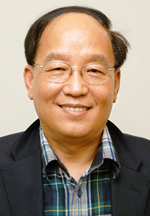 Professor Kwy-Ro Lee Appointed Distinguished Member of IEEE
Professor Kwy-Ro Lee from the Department of Electrical Engineering at KAIST was selected as a distinguished member of the Institute of Electrical and Electronics Engineers (IEEE) where his contribution to research development of the technological management of semiconductors was recognized.
Professor Lee earned his BS from Seoul National University and MS & Ph.D. from the University of Minnesota. He has been working as a professor in the Department of Electrical Engineering since 1986. He has also served as the president of the LG Electronics Research Center in 2005 and the president of the Nanoscience and Technology Center at KAIST in 2010.
IEEE is the largest professional association for the advancement of technology in electrical, electronics, computing and communication with 400,000 members in 160 countries. Only 0.1 percent of members with over ten years of service can be selected as distinguished members based on their research devotion for society.
2014.01.02 View 7481
Professor Kwy-Ro Lee Appointed Distinguished Member of IEEE
Professor Kwy-Ro Lee from the Department of Electrical Engineering at KAIST was selected as a distinguished member of the Institute of Electrical and Electronics Engineers (IEEE) where his contribution to research development of the technological management of semiconductors was recognized.
Professor Lee earned his BS from Seoul National University and MS & Ph.D. from the University of Minnesota. He has been working as a professor in the Department of Electrical Engineering since 1986. He has also served as the president of the LG Electronics Research Center in 2005 and the president of the Nanoscience and Technology Center at KAIST in 2010.
IEEE is the largest professional association for the advancement of technology in electrical, electronics, computing and communication with 400,000 members in 160 countries. Only 0.1 percent of members with over ten years of service can be selected as distinguished members based on their research devotion for society.
2014.01.02 View 7481